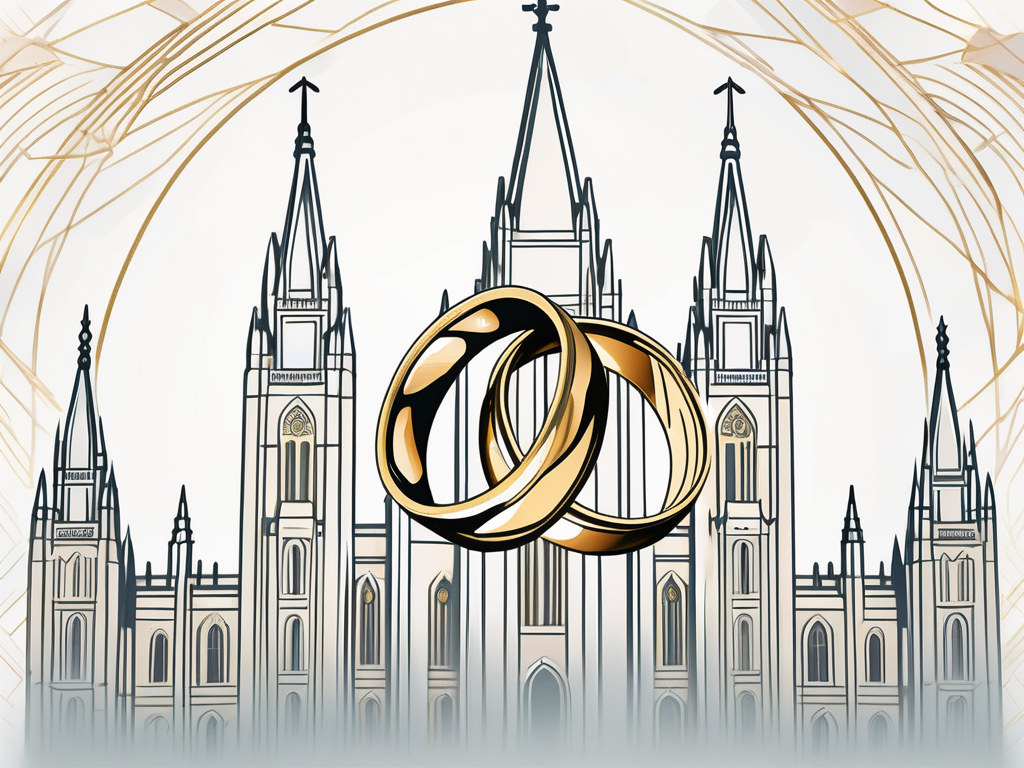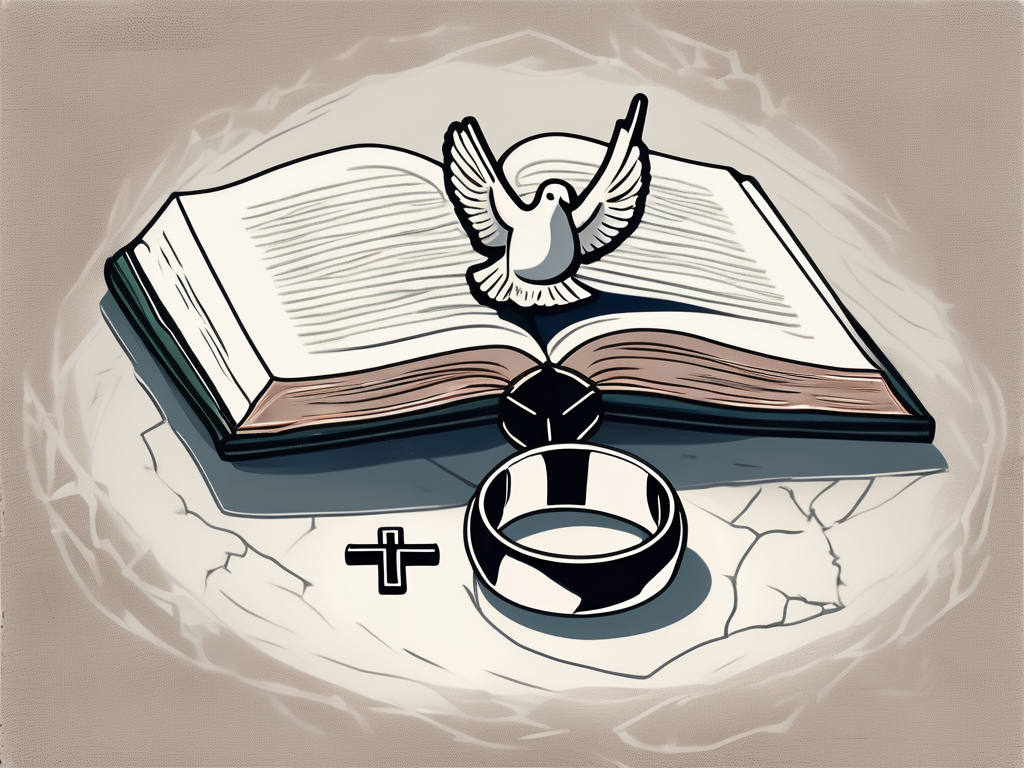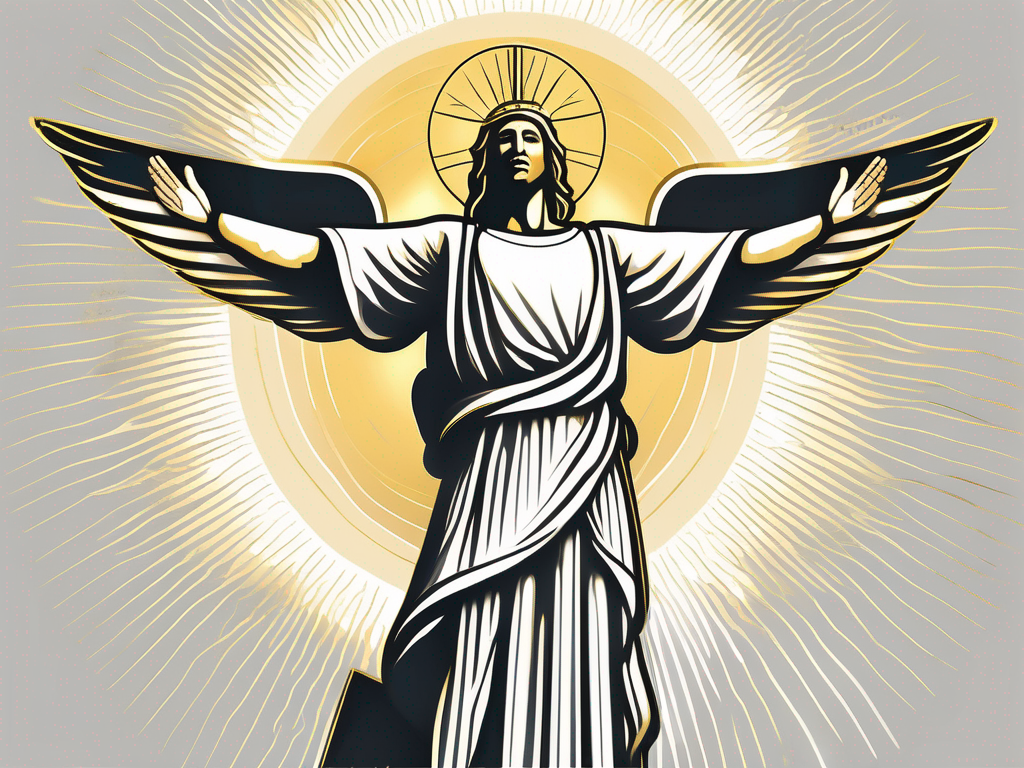Mormon beliefs about marriage are deeply rooted in the teachings and principles of The Church of Jesus Christ of Latter-day Saints. For Mormons, marriage is not only a sacred bond between two individuals, but it also holds eternal significance. In this comprehensive guide, we’ll explore the foundations of Mormon marriage, the marriage ceremony, the roles of spouses, teachings on marital challenges and divorce, and the intersection of Mormon marriage beliefs with modern society.
Understanding the Foundations of Mormon Marriage
Mormon marriage is built upon the concept of eternal marriage. This means that Mormon couples strive to create a union that not only lasts for this earthly life but continues into the eternities. The belief in eternal marriage is rooted in the understanding that families can be together forever. Mormons view the family as the fundamental unit of society and believe in the importance of establishing strong and lasting familial bonds.
Central to the concept of eternal marriage is the role of temple sealing. Mormons believe that through the sealing ceremony performed in the temple, couples can be bound together for time and all eternity. This sealing is considered essential for achieving exaltation, the highest degree of glory in the afterlife. It symbolizes the eternal nature of the marriage covenant and the unity of the couple in this life and the next.
Family is of paramount importance in Mormonism. Mormons believe that the family unit extends beyond this mortal life and stands at the core of their eternal progression. The teachings emphasize the importance of fostering a loving, supportive, and nurturing environment within the family, where individuals can grow and develop their talents under the guidance of their parents.
Within the context of eternal marriage, Mormons believe that the family unit is not limited to just the immediate family members. Extended family relationships are also considered crucial in the eternal plan. Mormons strive to maintain close ties with their extended family members, recognizing the importance of these connections in their eternal journey. This emphasis on extended family strengthens the sense of community and support within the Mormon faith.
In addition to the emphasis on family, Mormon marriage also places great importance on personal growth and development. Mormons believe that marriage provides an opportunity for individuals to learn and progress together, both spiritually and temporally. They encourage couples to support each other’s goals and aspirations, fostering an environment where both partners can thrive and reach their full potential.
Mormon couples are encouraged to prioritize their relationship and make time for each other amidst the demands of daily life. Regular date nights, open communication, and shared activities are seen as essential in maintaining a strong and healthy marriage. Mormons believe that a successful marriage requires effort, commitment, and a willingness to continually work on strengthening the bond between husband and wife.
Furthermore, Mormon teachings emphasize the importance of mutual respect, love, and equality within the marriage relationship. Husbands and wives are considered equal partners, with each having unique roles and responsibilities. While the husband is seen as the leader of the family, his leadership is expected to be based on love, kindness, and selflessness. The wife is regarded as a companion and helpmeet, with her input and contributions valued and respected.
Overall, Mormon marriage is founded on the principles of eternal love, commitment, and the belief in the eternal nature of the family unit. It is a union that extends beyond this mortal life, with the goal of creating a loving and supportive environment where individuals can grow, progress, and ultimately achieve exaltation together.
The Marriage Ceremony in Mormonism
Before entering into the sacred bond of marriage, Mormon couples undergo pre-marriage counseling and preparation. This involves meeting with their church leaders and attending classes that address topics such as communication skills, conflict resolution, financial management, and the importance of faith in a successful marriage. Through this process, couples are equipped with the necessary tools to build a strong foundation for their marriage.
During the pre-marriage counseling sessions, couples are encouraged to openly discuss their expectations, goals, and values. They are guided in exploring their individual strengths and weaknesses, as well as how they can complement and support each other in their future life together. These discussions provide a safe space for couples to address any concerns or fears they may have, ensuring that they enter into marriage with a clear understanding of each other’s needs and aspirations.
The wedding ceremony in Mormonism is a sacred event conducted in the temple. Only worthy members of the faith who hold a temple recommend can attend these ceremonies. The temple is seen as a place of holiness and divine presence, where individuals make sacred covenants with God. The wedding ceremony includes specific rituals and symbolic actions performed under the authority of the priesthood. These rituals are considered essential for sealing the marriage covenant and binding the couple together for eternity.
One of the key elements of the Mormon wedding ceremony is the exchange of vows. The couple stands at an altar, surrounded by their loved ones, as they make solemn promises to each other and to God. These vows are not only a commitment to love and cherish one another but also a dedication to living a righteous and faithful life together. The couple expresses their desire to follow the teachings of Jesus Christ and to build a family centered on love, unity, and service.
Following the wedding ceremony, Mormons have various post-wedding traditions and practices. These often include celebratory gatherings with family and friends, sharing of heartfelt vows and testimonies, and expressions of gratitude for the support and love that surrounds the newlywed couple. These post-wedding traditions further solidify the bonds of love and unity within the extended family and community.
One common post-wedding tradition among Mormons is the reception, where family and friends come together to celebrate the newlyweds. The reception is usually held at a venue or at the home of a family member, and it is filled with joy, laughter, and heartfelt speeches. Guests enjoy delicious food, lively music, and dancing, creating a festive atmosphere that reflects the happiness and excitement of the occasion.
Another important aspect of post-wedding celebrations in Mormonism is the sharing of testimonies. Testimonies are personal expressions of faith and belief in the teachings of the Church of Jesus Christ of Latter-day Saints. During these gatherings, family members and close friends may take turns sharing their testimonies, expressing their love and support for the newlyweds, and offering words of wisdom and encouragement for their future together.
In addition to the reception and testimonies, Mormons often engage in acts of service and gratitude following their wedding. This may involve organizing service projects, such as volunteering at local charities or helping those in need within their community. By serving others, the newlyweds demonstrate their commitment to the principles of love, compassion, and selflessness taught in their faith.
Overall, the marriage ceremony in Mormonism is a sacred and meaningful event that goes beyond the exchange of vows. It encompasses pre-marriage counseling, temple rituals, and post-wedding traditions that strengthen the bonds of love, unity, and faith within the couple and their community. Through these practices, Mormons strive to build marriages that are not only fulfilling in this life but also eternal in the presence of God.
The Role of Spouses in a Mormon Marriage
In a Mormon marriage, both the husband and the wife have vital roles and responsibilities. The husband is expected to provide for and protect his family. This includes not only financial provision but also emotional and spiritual support. He is encouraged to be a righteous provider, working diligently to meet the needs of his family and ensuring their well-being. Additionally, the husband is called to be a nurturing husband, showing love, kindness, and respect to his wife. He is also expected to be a loving father, actively involved in the upbringing and development of his children.
Furthermore, the husband is expected to lead his family in righteousness. This means that he takes the initiative to establish a home where the principles of the Mormon faith are practiced and upheld. He leads family prayer, scripture study, and encourages regular attendance at church services. By setting an example of faithfulness and devotion, the husband plays a crucial role in shaping the spiritual welfare of his family.
Similarly, the wife in a Mormon marriage is responsible for creating a nurturing and loving home environment. She is encouraged to support her husband in his role as the provider and leader of the family. This support can take many forms, such as offering encouragement, providing a listening ear, and actively participating in decision-making processes. The wife also plays a significant role in raising righteous children. She is called to teach them the principles of the Mormon faith, instilling in them a love for God and a desire to live according to His commandments.
Moreover, the wife is expected to provide emotional and spiritual guidance within the family. She creates an atmosphere of love and acceptance, where family members feel safe to express their thoughts and emotions. The teachings emphasize the importance of the wife’s role in fostering a supportive and harmonious marriage. She is encouraged to communicate openly with her husband, resolving conflicts with love and understanding. By nurturing a strong marital bond, the wife contributes to the overall well-being and happiness of the family.
Additionally, the wife is called to create an atmosphere of love and learning for her children. She is encouraged to teach them not only academic knowledge but also moral values and principles. The wife’s role extends beyond the physical care of her children; she is their primary teacher and guide. Through her words and actions, she helps them develop a strong foundation of faith and character.
In summary, in a Mormon marriage, both the husband and the wife have important roles to fulfill. The husband provides for and protects his family, leads them in righteousness, and nurtures a loving and supportive environment. The wife supports her husband, raises righteous children, and provides emotional and spiritual guidance. Together, they strive to build a strong and eternal family unit, grounded in the teachings of the Mormon faith.
Mormon Teachings on Marital Challenges and Divorce
Like any marriage, Mormon marriages are not immune to challenges. Mormons are taught to actively seek to resolve conflicts through open communication, humility, forgiveness, and a commitment to the principles of love and mutual respect. This commitment to working through difficulties is rooted in the belief that marriage is a sacred covenant between a man and a woman, and that it is worth fighting for.
Within the Mormon faith, marriage is considered to be an eternal bond that extends beyond mortality. This belief adds an extra layer of importance and significance to the commitment made by couples. It is believed that the bonds formed in marriage have the potential to endure beyond death and into the eternities. With this perspective, the challenges faced in marriage are seen as opportunities for growth and refinement.
Divorce is viewed as a last resort and is discouraged except under extreme circumstances, such as abuse or infidelity. The Church recognizes that there are situations where divorce may be necessary to protect the physical, emotional, or spiritual well-being of individuals and their children. In such cases, the decision to divorce is not taken lightly and is made after careful consideration and seeking guidance from Church leaders.
Mormons recognize that divorce can be a deeply painful and complex experience. The Church encourages support and understanding for individuals who have gone through divorce and strives to provide resources and counseling to help navigate the healing process. Divorce can bring about a range of emotions, including grief, guilt, anger, and confusion. It is important for individuals to have a support system in place to help them process these emotions and find healing.
Within the Mormon community, there are various support groups and programs specifically designed to assist individuals and families dealing with divorce. These resources offer a safe space for individuals to share their experiences, seek guidance, and find comfort in the company of others who have gone through similar challenges.
Additionally, the Church places a strong emphasis on the importance of family and community. In times of marital challenges or divorce, Mormons are encouraged to lean on their faith and seek solace in their relationship with God. Prayer, scripture study, and attending church services can provide individuals with a sense of peace and guidance during difficult times.
Ultimately, the goal of Mormon teachings on marital challenges and divorce is to preserve the sanctity of marriage while also offering support and guidance to those facing difficult circumstances. The Church believes in the power of redemption and healing, and encourages individuals to seek reconciliation and forgiveness whenever possible. Through a combination of faith, community support, and personal growth, Mormons strive to strengthen their marriages and build lasting relationships that can withstand the trials of life.
The Intersection of Mormon Marriage Beliefs and Modern Society
As society evolves, Mormons grapple with balancing their traditional beliefs with contemporary views on marriage. While the core principles of eternal marriage and family remain steadfast, there is an ongoing dialogue within the Mormon community about how to adapt to changing times while staying true to their foundational teachings.
One area that has sparked significant discussion is the intersection of Mormon marriage beliefs and the LGBTQ+ community. The Church has upheld the view that marriage is ordained between a man and a woman. However, there is an increasing awareness and sensitivity toward the lived experiences of LGBTQ+ individuals within the Mormon community, with efforts to promote understanding and compassion while upholding the religious doctrines.
In conclusion, Mormon beliefs about marriage are centered on the eternal nature of the marital bond, the role of temple sealing, and the importance of family. The marriage ceremony, roles of spouses, teachings on marital challenges, and the intersection of Mormon marriage beliefs with modern society all contribute to a comprehensive understanding of the Mormon perspective on marriage. These beliefs provide a foundation for Mormons in navigating the challenges and joys of married life while striving for eternal unity and growth within the family unit.












